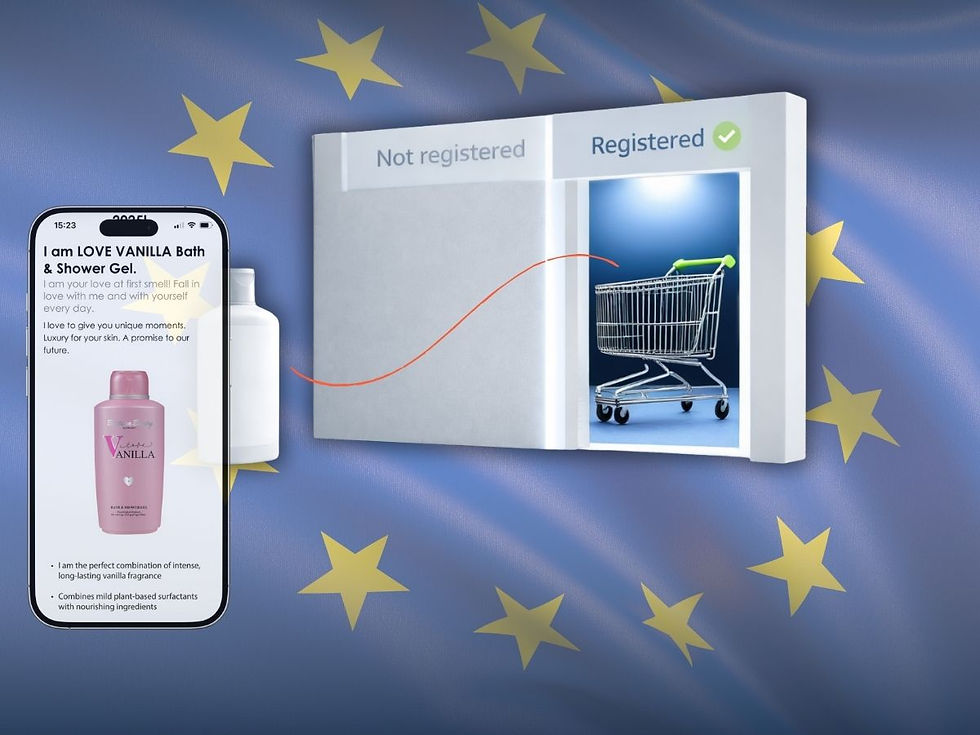Digital Product Passport: The New Foundation for Product Data in Europe
- Lioba Galliet

- Nov 26, 2025
- 3 min read

While some regulations lose momentum, the DPP stays
Germany’s Supply Chain Act has already been softened and parts of the Green Deal are being reprioritized. But one element remains firmly in place:the Digital Product Passport (DPP).
Because even though the DPP originated within the Green Deal, it was never a pure sustainability instrument. From the start, it has been designed as Europe’s digital product data backbone.
Digital Product Passport: What it means for product data in companies
The Digital Product Passport fundamentally reshapes how product data must be structured, connected and maintained. Four shifts stand out:
1. Product data must become structured, linked and versionable
The DPP requires information across the entire product life cycle:
materials → components → manufacturing → use → repair → recycling
To deliver this, companies need consistent data models and centralized information architectures.
2. Compliance becomes digital
The DPP becomes a core proof-of-compliance instrument for market access and product safety. PDFs and Excel sheets will no longer be sufficient — data must be machine-readable and interoperable.
3. Supplier integration becomes unavoidable
Many required data points are generated in the supply chain. Companies will need digital data flows with suppliers — structured, standardized, and automated.
4. IT systems must work together
To provide DPP-ready data, information from ERP, PIM, MDM, PLM and supplier systems must be consolidated — technically or through harmonized processes.Those who start early can build structured processes, test iteratively and develop DPP-ready data infrastructures now.
Why political shifts do not affect the DPP
While sustainability topics in the EU are being reweighted, the Digital Product Passport is not part of those shifts. It is firmly embedded in the European product regulatory framework, particularly in the Ecodesign for Sustainable Products Regulation (ESPR).
The Digital Product Passport is a key innovation under the 2024 Ecodesign for Sustainable Products Regulation to store and share relevant data about a product's sustainability, durability and other environmental aspects.
European Commission, DG GROW ,2025 – press release
In other words:
The DPP becomes Europe’s central digital infrastructure for product data.
The DPP becomes Europe’s shared product data layer
The European Commission describes the DPP as a system that records, processes and makes product information accessible across the entire value chain — for companies, authorities and consumers.
This creates a horizontal digital infrastructure that:
harmonizes product data,
enables digital market surveillance,
and is mandated across multiple EU legal acts.
The DPP will be required across a wide range of products and will provide authorities, consumers and supply-chain actors with reliable information on product compliance, sustainability and circularity.
European Commission — ESPR introduction, 2024
And further:
It will create a harmonised framework for product information to support the functioning of the internal market and market surveillance.
(European Commission — ESPR introduction, 2024)
Why the DPP is here to stay
Four factors make the Digital Product Passport one of the most robust regulatory innovations in Europe:
1. Systemic integration
The DPP is embedded across multiple EU regulations.→ Removing it would require rewriting large portions of EU product law.
2. Economic efficiency
Harmonized product data reduce costs, testing efforts, and supply-chain risks.
3. Digital market surveillance
The DPP is essential for conducting digital product checks — a key future capability for EU authorities.
4. A global trend
The U.S. (FDA data schemes), China (product traceability standards) and the UK are moving in the same direction.
The DPP becomes the standard
Despite political debates around the Green Deal or supply chain regulation, the direction is unmistakable: The Digital Product Passport is becoming the mandatory, foundational product data infrastructure in Europe.
Not only for sustainability but for product compliance, market surveillance and digital supply chains.


